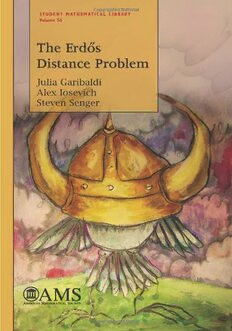Table Of ContentSTUDENT MATHEMATICAL LIBRARY
Volume 56
The Erdo˝s
Distance Problem
Julia Garibaldi
Alex Iosevich
Steven Senger
The Erdo˝s
Distance Problem
STUDENT MATHEMATICAL LIBRARY
Volume 56
The Erdo˝s
Distance Problem
Julia Garibaldi
Alex Iosevich
Steven Senger
Providence, Rhode Island
Editorial Board
Gerald B. Folland Brad G. Osgood (Chair)
Robin Forman John Stillwell
2010 Mathematics Subject Classification. Primary 05–XX, 11–XX,
42–XX, 51–XX.
For additional information and updates on this book, visit
www.ams.org/bookpages/stml-56
Cover Artwork: Hal, the Pigeon, watercolor, tempera, graphite, latex
paint on canvas, (cid:2)c 2010 by Nancy K. Brown. Used with permission.
Back Cover Photos: Courtesy of the authors. Used with permission.
Library of Congress Cataloging-in-Publication Data
Garibaldi,Julia,1976–
TheErd˝osdistanceproblem/JuliaGaribaldi,AlexIosevich,StevenSenger.
p.cm. —(Studentmathematicallibrary;v.56)
Includesbibliographicalreferencesandindex.
ISBN978-0-8218-5281-1(alk.paper)
1.Combinatorialanalysis. 2.Numbertheory. 3.Harmonicanalysis. 4.Ge-
ometry. I.Iosevich,Alex,1967– II.Senger,Steven,1982– III.Title.
QA164.G37 2010
511(cid:2).6—dc22
2010033266
Copying and reprinting. Individual readers of this publication, and nonprofit
libraries acting for them, are permitted to make fair use of the material, such as to
copy a chapter for use in teaching or research. Permission is granted to quote brief
passagesfromthispublicationinreviews,providedthecustomaryacknowledgmentof
thesourceisgiven.
Republication,systematiccopying,ormultiplereproductionofanymaterialinthis
publicationispermittedonlyunderlicensefromtheAmericanMathematicalSociety.
Requests for such permission should be addressed to the Acquisitions Department,
AmericanMathematicalSociety,201CharlesStreet,Providence,RhodeIsland02904-
2294USA.Requestscanalsobemadebye-mailtoreprint-permission@ams.org.
(cid:2)c 2011bytheAmericanMathematicalSociety. Allrightsreserved.
TheAmericanMathematicalSocietyretainsallrights
exceptthosegrantedtotheUnitedStatesGovernment.
PrintedintheUnitedStatesofAmerica.
(cid:2)∞ Thepaperusedinthisbookisacid-freeandfallswithintheguidelines
establishedtoensurepermanenceanddurability.
VisittheAMShomepageathttp://www.ams.org/
10987654321 161514131211
Contents
Foreword ix
Acknowledgements xi
Introduction 1
§1. A sketch of our problem 1
§2. Some notation 3
Exercises 5
√
Chapter 1. The n theory 7
§1. Erd˝os’ original argument 7
§2. Higher dimensions 9
§3. Arbitrary metrics 11
Exercises 13
Chapter 2. The n2/3 theory 15
§1. The Erdo˝s integer distance principle 15
§2. Moser’s construction 16
Exercises 20
Chapter 3. The Cauchy-Schwarz inequality 23
§1. Proof of the Cauchy-Schwarz inequality 23
v
vi Contents
§2. Application: Projections 25
Chapter 4. Graph theory and incidences 29
§1. Basic graph theory 29
§2. Crossing numbers 33
§3. Incidence matrices and Cauchy-Schwarz 36
§4. The Szemer´edi-Trotter incidence theorem 38
Exercises 42
Chapter 5. The n4/5 theory 45
§1. The Euclidean case: Straight line bisectors 45
§2. Convexity and potatoes 51
§3. Sz´ekely’s method for potato metrics 56
Exercises 61
Chapter 6. The n6/7 theory 65
§1. The setup 65
§2. Arithmetic enters the picture 67
Exercises 69
Chapter 7. Beyond n6/7 71
§1. Sums and entries 71
§2. Tardos’ elementary argument 72
§3. Katz-Tardos method 74
§4. Ruzsa’s construction 77
Chapter 8. Information theory 81
§1. What is this information of which you speak? 81
§2. More information never hurts 83
§3. Application to the sums and entries problem 88
Chapter 9. Dot products 91
§1. Transferring ideas 91
§2. Sz´ekely’s method 93
§3. Special cases 95
Contents vii
Exercises 99
Chapter 10. Vector spaces over finite fields 101
§1. Finite fields 101
§2. Vector spaces 103
§3. Exponential sums in finite fields 109
§4. The Fourier transform 115
Chapter 11. Distances in vector spaces over finite fields 119
§1. The setup 119
§2. The argument 121
Chapter 12. Applications of the Erd˝os distance problem 127
Appendix A. Hyperbolas in the plane 131
Appendix B. Basic probability theory 135
Appendix C. Jensen’s inequality 139
Bibliography 143
Biographical information 147
Index 149
Foreword
There are several goals for this book. As the title indicates, we cer-
tainly hope to familiarize you with some of the major results in the
study of the Erd˝os distance problem. This goal should be easily at-
tainable for most experienced mathematicians. However, if you are
not an experienced mathematician, we hope to guide you through
many advanced mathematical concepts along the way.
Thebookisbasedonthenotesthatwerewrittenforthesummer
program on the problem, held at the University of Missouri, August
1–5, 2005. This was the second year of the program, and our plan
continued to be an introduction for motivated high school students
to accessible concepts of higher mathematics.
This book is designed to be enjoyed by readers at different levels
of mathematical experience. Keep in mind that some of the notes
and remarks are directed at graduate students and professionals in
the field. So, if you are relatively inexperienced, and a particular
comment or observation uses terminology1 that you are not familiar
with, you may want to skip past it or look up the definitions later.
Ontheotherhand,ifyouareamoreexperiencedmathematician,feel
freetoskimtheintroductoryportionstogleanthenecessarynotation,
and move on to the more specific subject matter.
1One example of this is the mention of curvature in the first section of the
Introduction.
ix

